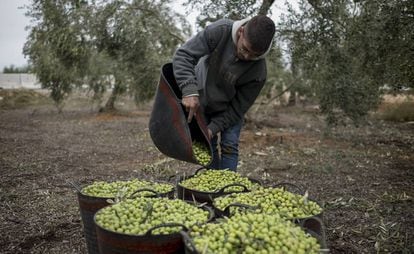Spain’s olive oil industry is already feeling the impact of Trump’s tariffs
The 25% levy on the product, combined with low prices and the EU’s failure to address storage issues, has hit the sector hard, with exports falling by 15,000 tons from November

The United States government’s decision to impose a 25% tariff on bottled Spanish olive oil in mid-October has pushed the industry to the point of near collapse. The situation has been worsened by a drop in the price of the product and the European Union’s slow response to private storage for olive oil surpluses. The plummeting prices have meant it is no longer profitable to harvest olives in rain-fed orchards. What’s more, the sector fears that the US administration of President Donald Trump will increase the tariff on olive oil sold in containers of less than 18 kilograms, and apply new levies to bulk shipments.
If the situation continues businesses may have to relocate bottling plants
The US tax, which is not imposed on olive oil from Spain’s European competitors such as Italy, Greece and Portugal, affects around half of the 120,000 tons of Spanish olive oil that was being exported to the United States. Another 70,000 tons of Spanish olive oil that is sent to the US via Italy are also affected, and several thousand more tons that go through other countries, according to industry estimates.
The tax has already had a direct impact on the market: olive oil exports dropped to 70,000 tons in December, down from 85,000 tons in November and 106,000 tons in October. At the same time, the industry has had to import a record 20,000 tons of olive oil to export the packaged product to the US free of taxes.
According to industry sources, if the situation continues businesses will have to relocate some of the bottling plants to other countries. The group Acesur, which owns the olive oil brands Coosur and La Española, is buying oil in Portugal, Greece and North Africa, and bottling it in Spain. The company Borges is planning on bottling its olive oil products in Tunisia, where it has a plant. And the Portuguese brand Sovena, which produces olive oil for the Spanish-owned supermarket chain Mercadona, has a packaging plant in Portugal and another one in the US. These three big companies, together with Dcoop and Deoleo, control more than 500,000 tons of olive oil in Spain.
EU response
With just a few weeks to go before the end of the main olive harvest, cooperatives still have olive oil left over from the previous harvest. The difficulty of storing the surplus has meant that they have had to sell this olive oil at a low price to make space for the new product.
The European Union has done little to resolve the crisis sparked by Trump’s tariffs, which were imposed in response to the EU subsidies for European aircraft maker Airbus. In an effort to alleviate the glut of olive oil on the market and improve prices, the European Commission agreed in November to help cover the cost of storing virgin olive oils in bulk. The Commission promised that the private storage scheme would cover more than 150,000 tons, but to date only 21,000 tons have been stored.
Agustín Rodríguez, an olive grower from the Agriculture and Farming Professional Organization in the southern region of Andalusia, fears that the industry will collapse if a rainy spring season brings a strong harvest. According to figures, some cooperatives are already using 30% of their storage space to hold older olive oil, and have not got enough space for all of the new product. Rodríguez believes the problem could be addressed by organizing the supply and changing industry strategies to find new markets for their quality product.
Antonio Luque, the head of the top global olive oil cooperative Dcoop, says the sector needs to be more organized and ensure that they have enough storage to hold two million tons of olive oil.
English version by Melissa Kitson.
More information












































